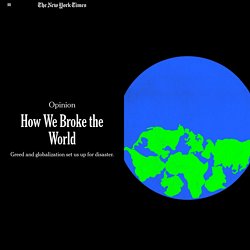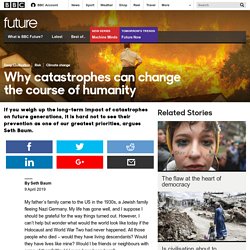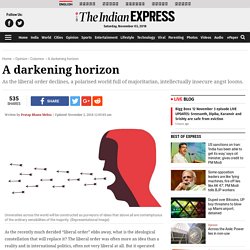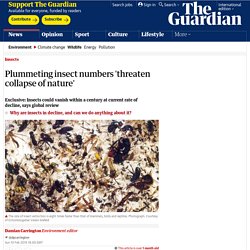

Coronavirus Showed How Globalization Broke the World. The coronavirus that caused SARS was hosted by bats and palm civets.

It jumped to humans because we had been pushing and pushing high-density urban population centers more deeply into wilderness areas, destroying that natural buffer and replacing it with monoculture crops and concrete. When you simultaneously accelerate development in ways that destroy more and more natural habitats and then hunt for more wildlife there, “the natural balance of species collapses due to loss of top predators and other iconic species, leading to an abundance of more generalized species adapted to live in human-dominated habitats,” Johan Rockstrom, the chief scientist at Conservation International, explained to me. These include rats, bats, palm civets and some primates, which together host a majority of all known viruses that can be passed on to humans. SARS jumped from mainland China to Hong Kong in February 2003, when a visiting professor, Dr.
Yup, Room 9-1-1. Scientists Model Costs of Geoengineering Effort to Dim the Sun. This site may earn affiliate commissions from the links on this page.

Terms of use. Geoengineering — the deliberate effort to manipulate the Earth’s climate in an attempt to offset, delay, or slow global warming — has slowly transformed from a pie-in-the-sky idea to a serious concept that may well be attempted one day. A wide variety of schemes have been proposed for how we might cool the Earth, but many of these would require the development of technologies far beyond our current capability. Nobody thinks we’ll be deploying solar shades to reduce incoming solar radiation any time soon, for example. On the other hand, the idea of seeding sulfur into the atmosphere is well within our technological grasp today, even if the tools and infrastructure for carrying out this process on an ongoing and planet-wide basis do not currently exist.
Here’s the team’s conclusion: Solar geoengineering is often described as ‘fast, cheap, and imperfect. The Astronomical Cost of Doing Nothing. Future - Why catastrophes can change the course of humanity. My father’s family came to the US in the 1930s, a Jewish family fleeing Nazi Germany.

My life has gone well, and I suppose I should be grateful for the way things turned out. However, I can’t help but wonder what would the world look like today if the Holocaust and World War Two had never happened. All those people who died – would they have living descendants? Would they have lives like mine?
Would I be friends or neighbours with some of them? This article is part of a BBC Future series about the long view of humanity, which aims to stand back from the daily news cycle and widen the lens of our current place in time. That’s why the Deep Civilisation season will explore what really matters in the broader arc of human history and what it means for us and our descendants. At the Very Least We Know the End of the World Will Have a Bright Side.
Adam Boffa | Longreads | December 2018 | 9 minutes (2,324 words) The oil industry in the U.S. has had a busy few years.

In North Dakota alone, barrel production increased more than tenfold between 2005 and 2015. The state’s daily oil barrel output surged from a low of 90,000, and within a decade it was consistently producing over one million barrels of oil per day. A majority of this oil was extracted via fracking, a controversial practice linked to a litany of harmful health and environmental effects. But if there were to be a public reckoning with fracking’s dangers in North Dakota, it would have to overcome steep challenges. It’s not just North Dakota, of course. Those associated with it tend to hold out hope that solarpunk could be a starting point for something bigger, something that could help propel a shift away from our contemporary sense of defeatism. Mainstream media coverage of climate change is not as dependable as needed, given the stakes.
Editor: Dana Snitzky. The World Might Actually Run Out of People. A darkening horizon. Universities across the world will be constructed as purveyors of ideas that above all are contemptuous of the ordinary sensibilities of the majority.

(Representational Image) Plummeting insect numbers 'threaten collapse of nature'. The world’s insects are hurtling down the path to extinction, threatening a “catastrophic collapse of nature’s ecosystems”, according to the first global scientific review.

More than 40% of insect species are declining and a third are endangered, the analysis found. The rate of extinction is eight times faster than that of mammals, birds and reptiles. The total mass of insects is falling by a precipitous 2.5% a year, according to the best data available, suggesting they could vanish within a century. The planet is at the start of a sixth mass extinction in its history, with huge losses already reported in larger animals that are easier to study. But insects are by far the most varied and abundant animals, outweighing humanity by 17 times. Insect population collapses have recently been reported in Germany and Puerto Rico, but the review strongly indicates the crisis is global.